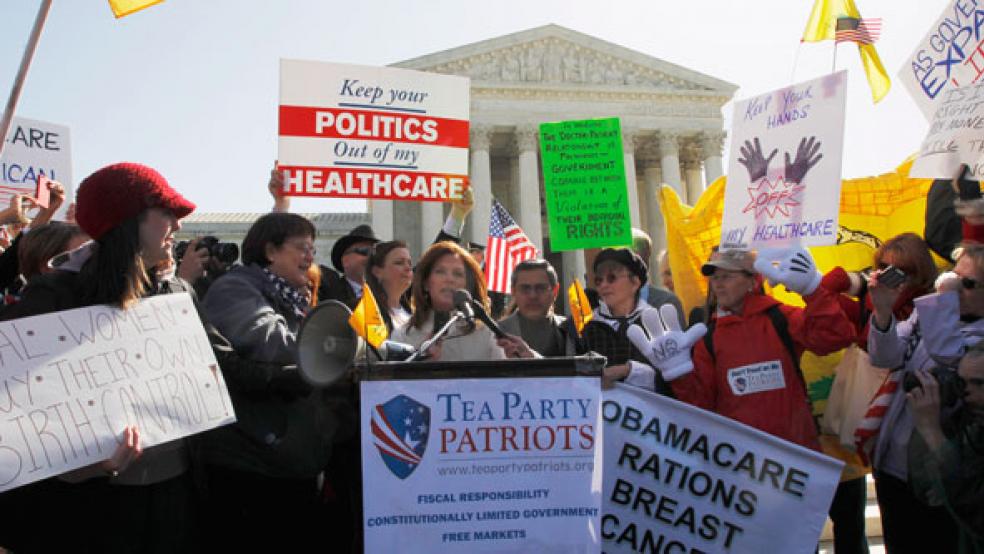Here we go again. All eyes are on the Supreme Court as it wrestles with whether or not President Obama’s healthcare bill is constitutional. The country is divided on the merits of the law, but this we can say with certainty: Obamacare profoundly gummed up our recovery from the financial crisis.
Like every predecessor, President Obama has made mistakes. Perhaps none will cloud his legacy more that his decision to focus on overhauling our healthcare system early in his administration – before our economic recovery had gained enduring momentum.
Assuming that the $800 billion Recovery and Reinvestment Act, aka the stimulus, would work the magic promised by his economics team, Mr. Obama set off on his quest to guarantee healthcare for every American. The resulting food fight over the legislation – the ugly parceling out of favors in return for votes and lies told to justify passage -- permanently damaged President Obama’s reputation, divided a country desperate to heal, and distracted the White House from further efforts to build employment. It was a terrible decision, and the country continues to pay for it.
Whether or not the Supreme Court upholds the government’s mandate that every American must purchase healthcare insurance, Obamacare is a failure.
It was, ironically, a decision made by a president eager to secure his legacy. Undaunted by the abject failure of Hilary Clinton to win support for universal healthcare, Mr. Obama took up the quest with enthusiasm. Just as he admitted to excessive optimism about bringing peace to the Middle East in an interview in Time Magazine, dubbing that effort “really hard,” Mr. Obama naively staked his presidency on healthcare reform. Here’s a shocker: remaking 17percent of the economy is also “really hard.”
Whether or not the Supreme Court upholds the government’s mandate that every American must purchase healthcare insurance, Obamacare is a failure. In spite of innumerable speeches, editorials and presentations on the merits of the law, Americans don’t like it. Though most people recognize that ever-rising healthcare outlays threaten our nation’s fiscal integrity, they can’t imagine that granting free health services to 30 million Americans will solve the problem. They see the Affordable Care Act as a massive expansion of government activity that will not make healthcare affordable but that will instead drive costs higher as millions more receive a blank check for medical services.
Moreover, many Americans think Obamacare failed to tackle many of the actual causes of excess healthcare spending – the lawsuits that mandate unnecessary procedures by vulnerable doctors (the CBO estimates capping malpractice awards would save taxpayers $54 billion over ten years), the fact that so many patients have “no skin in the game” and therefore undertake treatments oblivious to any reasonable cost/benefit analysis, and often wasteful reimbursement procedures. The legislation patently failed to “bend the curve” on Medicare and Medicaid outlays, which is why Congress continues to argue over how to fix those programs’ dismal future.
Obamacare’s biggest fault is that it distracted officials from sustained efforts to reboot our economy.
With all these shortcomings, Obamacare’s biggest fault is that it distracted officials from sustained efforts to reboot our economy. The National Federation of Independent Businesses (NFIB) is a co-plaintiff in the lawsuit challenging the constitutionality of Obamacare. That should give the law’s backers pause. The NFIB claims to represent hundreds of thousands of members who own small businesses, the people that both Democrats and Republicans say are the country’s main job creators. The NFIB says that in signing Obamacare into law, President Obama “essentially declared was on every small business in American by unilaterally renouncing their rights and dooming them to decades of increasing health insurance costs.”
Though confidence among small business owners polled by the NFIB has modestly increased over the past six months, the gains are from unprecedented lows. Only 4 percent of respondents indicate an interest in adding to employment – during a “normal” recovery, the organization says, “Job creation plans would be in double digits.” Pessimism about the economy is profound; small business owners have rising anxiety about poor sales (their number one problem) and in almost equal measure, about taxes and red tape.
Not only did the wrangling over healthcare deflate our business community, it also left President Obama with a personal capital deficit. Having pulled in every conceivable favor to get his bill through Congress, he was out of chips when the economy began yet again to soften. The Obamacare battle further emasculated the White House by vaulting the unlikely Scott Brown into Ted Kennedy’s Senate seat and later by turning the House over to the GOP. In late 2009, the president had a filibuster-proof majority in the Senate and controlled the House. Had he pushed, he would have found support for more stimulus spending.
The reality is that numerous projects and programs might have passed a less fractious Congress and been supported by a less divided country.
What might have been? More attention might have been paid to housing, which has only recently begun to bottom. Though the administration has lobbed numerous efforts to accelerate mortgage modification (HAMP, HARP etc.), none has enjoyed a full-court press or been especially meaningful. Creating jobs for construction workers through private/public partnerships dedicated to infrastructure repair would have been popular; most Americans acknowledge the need for spending on our bridges and airports. Mr. Obama might have gotten more traction on subsidizing investment to raise the energy efficiency of our office buildings or college campuses.
The reality is that numerous projects and programs might have passed a less fractious Congress and been supported by a less divided country. Though rising deficits ultimately would have alarmed taxpayers, more growth would have tempered both budget and enthusiasm gaps. Instead, we have suffered the worst of all worlds – a government hobbled by political and economic constraints and a people pessimistic about the future. This is the legacy of Obamacare.






